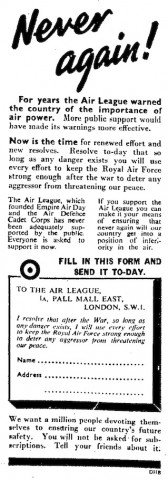This advertisement was placed by the Air League in The Times, 11 June 1940, on page 9 (it also appeared in the Daily Telegraph). The British Expeditionary Force had been ejected from France just a week before; Germany now occupied Belgium and the Netherlands. France was still fighting, but Paris had been declared an open city, and with Italy entering the war its position seemed hopeless. The RAF had evidently not been able to hold back the Luftwaffe, now only a few minutes’ flight from British soil, and this is where the Air League came in. It pointed out that
For years the Air League warned the country of the importance of air power. […] Now is the time for renewed effort and new resolves. Resolve to-day that so long as any danger exists you will use every effort to keep the Royal Air Force strong enough after the war to deter any aggressor from threatening our peace […] If you support the Air League you can make it your means of ensuring that never again will our country get into a position of inferiority in the air.
I wonder how far away the Air League thought ‘after the war’ was: years, months, weeks? Given that no money was being solicited (and the advertising itself was expensive), that would seem to suggest sooner rather than later: few people would feel obliged to keep such a pledge made years earlier under different circumstances. J. A. Chamier, the Secretary-General of the Air League whose idea it was, was a fascist fellow-traveller, so we may presume did not wish to fight Nazi Germany and Fascist Italy any longer than necessary. But then again to call for Britain to maintain its airpower at a high level after an armistice, say, is not treasonous. Whether this position is defeatist is debatable, though I tend to think it is, a little.
Note the distinctly petulant tone:
More public support would have made its [the Air League’s] warnings more effective […] The Air League, which founded Empire Air Day and the Air Defence Cadet Corps has never been adequately supported by the public.
I.e., dear British people: if you idiots had listened to us in the first place we wouldn’t be in this mess. Did this hectoring work? Though the Air League asked for a million pledges, by October it had received about 500, not an insignificant number compared to its total membership (before the war, in the low thousands) but not a lot either, when the immense gratitude people felt for the RAF after the Battle of Britain is taken into account.
![]() This work is licensed under a Creative Commons Attribution-NonCommercial-NoDerivatives 4.0 International License.
Permissions beyond the scope of this license may be available at http://airminded.org/copyright/.
This work is licensed under a Creative Commons Attribution-NonCommercial-NoDerivatives 4.0 International License.
Permissions beyond the scope of this license may be available at http://airminded.org/copyright/.





Looking at the technical periodicals produced in May-December, I eventually started reading most of the articles as saying that “No-one’s given me a real job, so I’m filling column space here at Engineering/The Engineer/Flight/The Aeroplane instead. The letter columns were even worse.
So I’m tempted to pronounce some kind of dictum on eras of national emergency along the lines of. If you actually have employable skills, you’re working too much overtime to write for the papers. It’s the unemployable who are left writing articles and planning advertising campaigns.
And, realistically, that means that most of them are writing-while-drunk.
That dictum surely doesn’t apply to Chamier, though. Having taken early retirement from the RAF in 1928 at the rank of air commodore and then working at Vickers Supermarine as Technical Director, he was a vigorous secretary general of the Air League during the 1930s. One of his brainchildren was the Air Defence Cadet Corps, which the Air League set up in 1938; Chamier was its commandant. By the end of 1939 it had 174 ‘squadrons’ around Britain. He was recalled to the RAF in 1940. In 1941 the Air Ministry took over the ADCC and renamed it the Air Training Corps, the name which it has today, but kept Chamier on as commandant until 1943. Clearly he was both able and busy.
Now, having defended a fascist I’m off to have a shower.